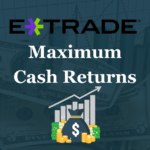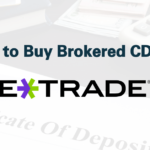What are the top E*Trade CD rates, and how do these CD rates compare with other brokered CDs? Look below for the highest E*Trade CD rates in May 2024. E*Trade CD rates can often change, so we suggest looking at E*Trade’s website for real-time information.
E*Trade CD Rates
E*Trade offers a selection of brokered certificates of deposit (brokered CDs), which differ from bank-issued CDs. Brokered CDs can only be accessed by customers of a brokerage firm such as E*Trade. E*Trade does not issue brokered CDs. Instead, E*Trade provides a selection of newly issued CDs from various banks and secondary CDs sold by other investors on the secondary market.
The following table displays the top E*Trade CD rates per maturity term for new issue CDs in E*Trade’s marketplace*:
APYs shown are as of May 1, 2024. Click to expand on mobile.
*Note: E*Trade CD rates can change. YieldAlley suggests checking E*Trade’s website for the latest information.
Buying CDs on E*Trade
- E*Trade Account Required: To buy brokered CDs on E*Trade, you must have a brokerage account with E*Trade to buy their brokered CDs.
- Fee for buying new-issue CDs: None.
- Fee for secondary CDs: E*Trade charges a $1 fee per CD for secondary trades online, with a $10 minimum commission fee per trade and a $250 maximum.
- Minimum investment per New-Issue CD: $1,000. You can buy more new-issue CDs in increments of $1,000.
- FDIC Insurance: Yes. E*Trade’s brokered CDs offer FDIC insurance of $250,000 per bank per depositor. For example, you have expanded FDIC coverage if you buy three CDs on E*Trade from three banks up to $750,000.
E*Trade CD Fees and Key Information
Frequency of Interest Payments: It depends. The frequency of interest payments on E*Trade varies depending on the CD. CDs with a maturity period of less than one year typically pay interest only when they mature. For 1-year CDs, interest is usually paid only when they mature, although some may pay interest every six months. However, for CDs with longer maturity periods of 18 months or more, interest may be paid every six months, every three months, or every month.
Monthly Fees: None. This is common for CDs.
Compounding: None. Brokered certificates of deposit (CDs) do not accrue compound interest, unlike bank CDs. Instead, brokered CDs accumulate simple interest.
Early Withdrawal Penalty: None. With E*Trade brokered CDs, there are no early redemption fees like there are for bank-issued CDs, but trading a brokered CD on the secondary market means you may receive less than the original purchase price.
Auto-Roll: No. E*Trade does not offer Auto-Roll, which means you cannot automatically reinvest your CD on E*Trade when your CD matures.
E*Trade IRA CD: Yes. If you have an IRA account with E*Trade, you can use that IRA to buy brokered CDs.
Types of CDs Offered By E*Trade
New Issue CDs: When a bank or financial institution introduces a new investment opportunity to the public, they issue a new issue CD. This certificate of deposit has a set duration and rate of interest, enabling investors to earn guaranteed profits on their investment for a designated timeframe.
Secondary CDs: A secondary CD is purchased on the secondary market from an existing owner. This allows investors to buy or sell a CD before its maturity date.
Callable CDs: A callable CD gives the issuing bank the option to call back the CD before the end of its maturity date. This means that the bank can redeem the CD early, usually after a specific period of time or on set dates. This feature generally is used when the bank wants to take advantage of lower interest rates.
Non-Callable CDs: A non-callable CD cannot be recalled by the issuer before its maturity date. This means that once you invest in a non-callable CD, the issuer cannot call it back or return your money until the agreed-upon maturity period. This makes non-callable CDs a more secure and predictable investment option than callable CDs.
Why is My E*Trade CD Losing Money?
If your CD appears to lose money, it could be due to rising interest rates, and because your E*Trade CD rates are now lower than the current interest rate. If you hold your CD until maturity, you will be guaranteed your original principal upon maturity, plus your interest payments.
If you notice your CD is losing money, do not be alarmed. As long as you plan on holding your CD to maturity, you will receive the entire principal back in full. As such, we recommend ignoring any fluctuation in the CD value if you plan on holding your CD to maturity.
E*Trade Cash Equivalents and Other Offerings
Cash equivalents are short-term, highly liquid investments that are readily convertible to known amounts of cash and subject to an insignificant risk of changes in value. CDs are generally considered a cash equivalent.
Some examples of cash equivalents include the following:
- Money Market Funds: E*Trade offers a variety of extremely safe mutual funds that invest in short-term, high-quality investments issued by federal, state, and local governments.
- Treasury Bills: These are short-term securities issued by the U.S. government with maturities of less than one year. Treasury bills are considered one of the safest investments and are often used as a benchmark for other interest rates.
- Certificates of Deposit (CDs): These are time deposits with banks or credit unions that are insured by the Federal Deposit Insurance Corporation (FDIC). They have a specific, fixed term and, usually, a fixed interest rate.
E*Trade offers the cash equivalent products listed above and other financial products.
I’ve Evaluated E*Trade’s CD Rates. Are These CDs a Good Fit for Me?
After reviewing the CD rates from E*Trade, it’s important to check if these CDs align with your financial goals and circumstances.
What should you consider?
- Risk Tolerance: Gauge your readiness to undertake financial risks. Certificates of Deposit (CDs) are essentially risk-free investments backed by FDIC insurance and provide a guaranteed return rate. However, they usually yield lower returns compared to riskier assets like stocks or mutual funds and lack the flexibility of Treasuries.
- Financial Goals: Determine your immediate and long-term financial goals. CDs can be an excellent option for short-term objectives or as a steady element in a diversified investment portfolio.
- Interest Rates: Evaluate the current interest rates. CDs can be an attractive option if the rates are favorable, as they offer fixed, guaranteed returns.
- Capital Preservation: CDs can be an appropriate option due to their low-risk nature if your main concern is protecting your capital rather than achieving high returns.
- Income Source: CDs can benefit those seeking a steady income source, particularly retirees, as they provide regular interest payments.
- Liquidity Needs: Consider your need for access to your funds. CDs require you to commit your money for a specified duration, so they might not be suitable if you require regular access to your cash.
- CD Laddering: Consider a CD ladder strategy, which entails purchasing a series of CDs with varying maturity dates.
CDs provide the opportunity to secure a guaranteed return in times of changing interest rates. We also highly recommend exploring other cash equivalents on E*Trade, like money market funds and Treasury bills, to maximize your cash yield. Other cash products generally provide more flexibility than CDs and can sometimes offer higher yields.





